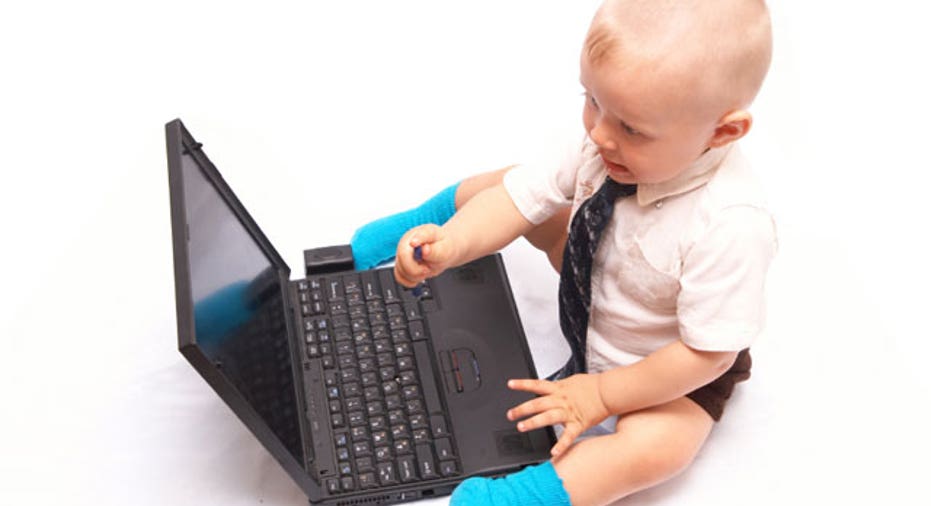The Baby Brand: Naming for Success… or Failure

Before they’re even old enough to walk—let alone fill out a resume—experts say the die is cast on a baby’s career success simply because of their name.
The pressure to name a child is heavy and the choices plentiful--if not endless--with names varying from “Bob” to “Pilot Inspektor” (the name of actor Jason Lee’s son). Even if you’re convinced that your cute bundle of joy is destined to be an artist, she also might want to become a CEO, and an unusual name could be the only thing standing in her way.
“To some extent the idea that a name will shape your destiny is a very old idea. In the modern day, it’s simply a fact that one doesn’t expect to find a high-powered female executive named ‘Bambi’ or ‘Britney,’” says Catherine Connors, spokesperson for Babble, an online parenting magazine.
Connors says that while a person is always free to change their name when they come of age, it's best if parents put some real thought into a name that straddles the fine line between “boring” and “extreme.”
“You are branding your child. To say that giving your baby a strange name would be a ‘curse’ is a strong word, but you’re definitely going to be hanging an albatross around their neck. At a certain point, if they want to move into a professional field, an oddball name is going to have to be something they address,” says Connors. “They’re going to have to make the tough decision of whether to change it completely, adapt the name, or go by their initials only.”
Likewise, choosing a name that doesn’t pack enough punch—like John Smith—parents run the risk of the child getting passed over because the name is too common, says Sharón Lynn Wyeth, author of Know the Name, Know the Person.
“If the name is too common, hiring managers are going to think, ‘This person has nothing new to bring to the table, so why hire them?’” says Wyeth. “Unless you’re looking for someone for a redundant task who will be seen and not heard, you’re going to look at that name and say, ‘This person is just more of the same.’”
Unfortunately, prejudice against names isn’t limited to the initial point of hire, says Connors. It’s also possible that a name can mean your child gets passed over for promotions.
“If your name is extremely odd or extremely flashy, it’s almost like wearing a low cut dress or glittery pumps to a business meeting,” says Connors. “People don’t take you as seriously, and they may bypass someone named ‘Angel’ for a promotion over someone named ‘Elizabeth.’
Of course, the impact of a name all depends on the field.
“If you are owning your eccentric name and you’re in a creative field, when your resume lands on the desk of a curator for a gallery of post modern art, then your name is going to be an asset to you,” Connors says. “The danger is [parents] have no way of knowing what direction your child will take.”
One possible benefit to giving your child an off-kilter name is that there’s little danger of them being confused for someone else. This comes in especially handy if your child wants to have a strong presence on social media or purchase a personal URL.
“What to name your child is of paramount concern for parents now because of social media. It increases the pressure to have children stand out,” she says. “Our lives are more public than they have ever been in the course of human history, and with a name, you have a larger context of someone’s very public lives to consider.”
Wyeth points to Reese Witherspoon as an example of someone in Hollywood who has “owned” their name and been successful with it, but cautions that an unusual name is never a guarantee for career success.
“When you have an unusual name, depending on who is interviewing you, they could either hire you or hold it against you,” she says. “If a hiring manager is more conservative in their thinking, you have a better chance with a common name. Likewise, if someone can’t pronounce your name, then you may seem incompetent, because the person felt incompetent when they read your name.”
While some parents may find inspiration in celebrity baby names, they should keep in mind that what’s good for those on the silver screen is not always good for the average person, Connors says.
“With celebrities, it’s much more obvious that there’s a branding consideration with names,” she says. “Celebrities are trying to make their children appealing and distinctive to a wider audience. All parents have at least some of that consideration in mind, but there is a wide and dangerous gulf between ‘Bill’ and ‘Apple.’”



















